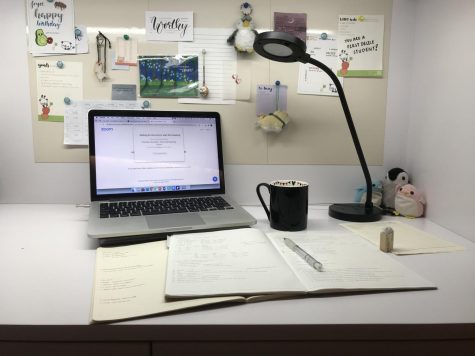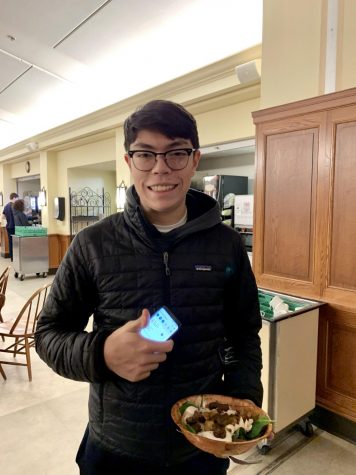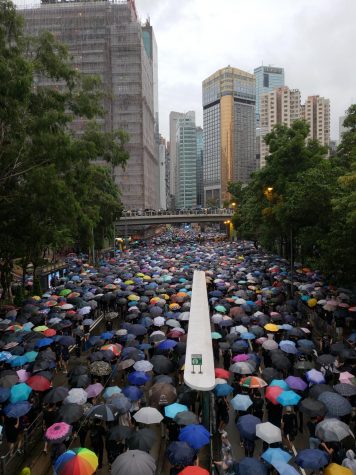Professor YuHua Wang Educates Kent on US-China Relations

December 1, 2018
On the evening of Monday, November 5th, Kent School had the pleasure of hosting Professor Yuhua Wang of Harvard University. Professor Wang, who received his B.A. from Peking University and Ph.D. from the University of Michigan, is currently a Faculty Associate at the Harvard Fairbank Center for Chinese Studies and the Weatherhead Center for International Affairs.
Professor Wang began with a brief overview of US-China relations, starting off with 1949, which “marked the beginning of a new era”. He described the fraught beginnings of the relations between the countries, as “the mainland regime had no formal diplomatic relations with the United States.”
Professor Wang went on to describe the numerous diplomatic challenges, including the Korean War and the Sino-Soviet Split. He stressed the geopolitics that caused both China and USA’s involvement in the Korean War.
“The US was involved because if the South was invaded by the North, the whole Korean Peninsula would become a territory under Soviet control… China also reacted because if the South won, the whole Korean peninsula would become US territory.” Professor Wang remarked upon the futility of the war, saying, “There was no winning side. Casualties on both sides were very high.”
However, he said it was important to note that the event had a positive effect for the Chinese government, because “in China, they portrayed this as a very big win over the strongest nation in the world. Two or three years after the establishment of the new regime, the people were enthusiastic volunteers, and the victory helped the regime consolidate power”.
Another important event in US-China relations was the Chinese development of the atomic bomb in 1964. “It was now a conflict between two nuclear powers and would become important in the future of US-China relations.”
When China’s relationship with the Soviet Union changed, the relationship between the US and China was also altered. “China had seen the Soviet Union as their big brother, and they borrowed a lot of Soviet technologies and took out a lot of loans from them.” With Stalin’s death in 1956, everything changed: “Stalin’s successor, Khrushchev, in his Secret Speech to the Party Congress, said that Stalin was not a hero.”
Professor Wang described this event as a “huge shock to the Communist world, especially to China, who viewed Stalin as the leader of the Communist world.” This event, along with Mao’s belief that “he, himself, should become the next leader of the Communist world,” would sour Soviet-Chinese relations. Professor Wang attributed the Sino-Soviet Split to a combination of the Secret Speech, economic problems relating to the Chinese inability to pay back Soviet loans, and the disagreement towards future leadership of global Communism.
Professor Wang said that the aftermath of “the Sino-Soviet Split dramatically changed the balance of international relations, with the Soviet Union and Eastern Europe on one side, China on one side, and the US on another.”
The biggest breakthrough for US-China relations, Professor Wang said, occurred in the 1970s, starting with an interaction between the US and Chinese table tennis athletes. “The leaders are not talking to each other, but the table tennis players are.” Both sides seized the opportunity. With overtures from Henry Kissinger, Mao Zedong agreed to “negotiate some terms” with the US.
“At least they can start talking,” Professor Wang said. The relationship, however, was not yet public, according to Professor Wang. During Nixon’s visit to China, Nixon wanted to “use this opportunity to unite against the Soviet Union.” Mao agreed, but stressed that “in the media, we curse each other all the time–we should continue to curse each other because the people are not used to us talking to each other.”
After Mao’s death, the new leader of China, Deng Xiaoping, formalized relations with the Carter administration. Professor Wang pointed specifically to Deng Xiaoping’s visit to Texas, during which he wore a 10-gallon cowboy hat, as a turning point in US-China relations, as it “charmed the American audience”. After this, “China opened up its doors to foreign investors”. The first of these foreign investors would be an auto-manufacturer from Detroit.
Today, Professor Wang says that China is a major competitor for US regional hegemony. Professor Wang emphasized China’s increased militancy in the South China Sea over the islands, China’s protectionist trade policies, and the Belt and Road Initiative as major sources of conflict.
While Professor Wang believes China is on the path to a law-bound society, he acknowledges recent developments, such as the abolition of term limits by Xi Jinping, as “authoritarian” maneuvers. He believes the Western World was mistaken to believe China would westernize ideology through trade and cultural interaction, but he hopes the recent US-China trade wars can come to a satisfactory conclusion for both sides. He concluded his presentation with the hope that with a greater understanding of China, there will be more opportunities to foster peace and collaboration.






